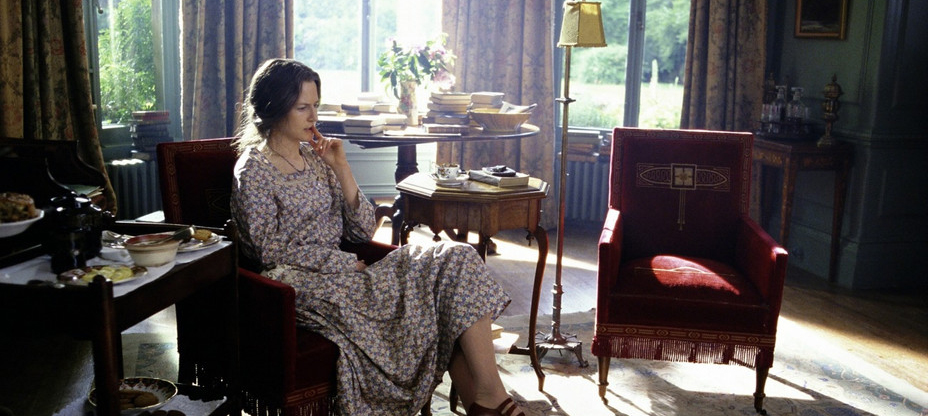“What does it mean to regret when you have no choice? It's what you can bear. There it is. No one's going to forgive me. It was death. I chose life.” - Laura Brown
Based on Michael Cunningham’s novel of the same name, which is also loosely based on the life of Virginia Woolf during the writing process of Mrs. Dalloway; The Hours to the maudlin misery guts—and by that I mean myself—are like Inception is to Nolan fanboys. It’s a glaring drama that deals with its ambition keenly, hear this: a story that takes place within the span of a single day in three different decades, alternating between three women and linked by their quandary that stands in the way of commitment and desire. On paper, it may seem mouthful, but through Stephen Daldry’s soothing direction, The Hours is one soul-stirring beauty. Daldry neatly sews the bridges between the chasms written by David Hare and is able to find its intrinsic rhythm, all then stitched beautifully by the adeptness of its lyrical ensemble of the star-studded cast and the rush of Phillip Glass’ reverberant score.
Helmed by the acting trifecta of Nicole Kidman, Julianne Moore, and Meryl Streep; these three women, separated by time and anchored by their collective minds, bring in powerhouse performances packed with a sure-fire emotional punch. Kidman, by a nose—as Denzel said it—and her mighty talent, is fully committed as Virginia Woolf. Kidman impressively registers pitch-perfect note after another, making her turn as Woolf as her most shocking yet—at that time—as she disappears into Woolf’s physicality: her posture and her tone of voice, reliving her spark of creativity and her state of mind. No more of that smooth, satin-like personality of hers in Moulin Rouge! nor the mean-spirited satirical character she plays unapologetically in To Die For. Yet, beyond the writer persona, Kidman shows her incredible control as she allows us to see through Woolf’s aching, yet unbeaten grit. She’s vulnerable without being completely wide open, adrift without being powerless: a guarded intensity of acuity with a flair of imperiousness.

Julianne Moore's turn as a shielded mother is every bit as interesting as Kidman’s portrayal, if not more. Secluded from her own existence and feelings, she wears a smile every day and carries herself as a loving, perfect ideal of the American dream in order to survive societal conventions, because really, she doesn’t have any choice. Conscious and awake, yet detached, so far removed, and everything in between, Moore is a vast amalgamation of nuances. It’s a truly tough part to pull off, yet she does so, and even more. Her willingness to go far in her craft is truly what makes The Hours an indelible mark of her acting mastery. Meryl Streep here carries less weight on her shoulder than the other two, but even with less flesh in her material, Streep is still a rounded, solid character that simply captivates. As Clarissa, she’s openly bisexual, able to acknowledge her liberty, and untied to the suppressive systemic customs that chain Moore and Kidman’s characters, yet she’s still afraid, unsure, and haunted by the choices she made/didn’t make. Backdropped with the 21st-century life setbacks and whatnot, her personal battle makes her the one character that most audiences can identify with. Her presence, despite being a looking glass to the audience, also operates as a filtered lens to see through these women’s stories, to make us observe and feel without feeling like a standalone onlooker, and it clearly works.
Through their powerful display of acting, The Hours makes the journey along the chasms themselves rewarding, but clearly, the script plays an even bigger part: how the narrative looks at life in the eyes, searching for and reflecting on choices or the lack of them. Even if it’s not always a smooth ride, the result is always fulfilling. The journey feels like a never-ending disquiet at the minutiae of everyday life, as they welcome us right at the pits, as they plummet deeper into sorrow, regret, and pain; grieving for the lives they could’ve had and even further: the unraveling of their perpetuated suffering. Though the movie abstains itself from depicting the detailed, seemingly-trivial grounds, and instead takes the focus into a kaleidoscope of life’s repercussions; The Hours doesn’t come across as an empty vessel of skin-deep life horror. The script carefully navigates between each mind, in which one idea is echoed to the next, gradually mounting one single, giant resonating force. It’s true that pain is an attested measure of reality, and even if this cinematic approach to storytelling may take some of its sense of realism and complexity away, that exact sentiment is the one that brings its somber motif into the limelight. It’s not new and since then many have done it even better, but the grasp is what makes The Hours a personal epic that’s poignant, expressive, and ultimately earnest.
















0 comments:
Post a Comment